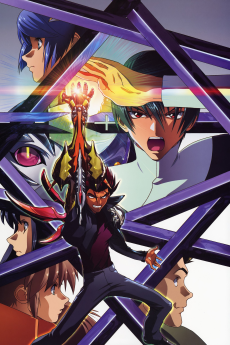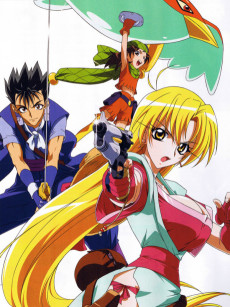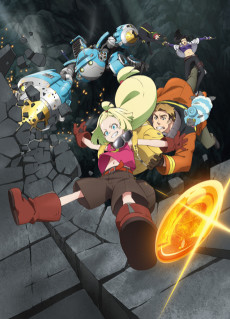GUN X SWORD
STATUS
COMPLETE
EPISODES
26
RELEASE
December 26, 2005
LENGTH
24 min
DESCRIPTION
Van, a lanky and apathetic swordsman, is on a journey to kill the murderer of his fiancé. The only characteristic he has to go by is that the murderer has a claw for an arm, hence the murderer being referred to as The Claw Man. During his travels, Van happens to pass through the city of Evergreen, which is defending itself from bandits who aim to rob the city of its treasury. It is in this city that Van meets Wendy Garret, a timid young girl who is looking for her kidnapped brother. When the city pleads for Van's assistance to defend it, he refuses, claiming it has nothing to do with him and thus leaves the city on its own to deal with the peril. Soon after, Van comes across the raiding bandits himself and they eventually tick off the swordsman to a degree where he takes action against them for his own personal vendetta. Surprisingly, Van learns that the bandits had ties with The Claw Man, and in kidnapping Wendy's brother for a reason they did not disclose. After the bandits are dealt with easily, Van and, much to his chagrin, Wendy continue the journey in search of The Claw Man. Little do they know, however, that The Claw Man is involved with something more atrocious than either could fathom.
[Written by MAL Rewrite]
CAST
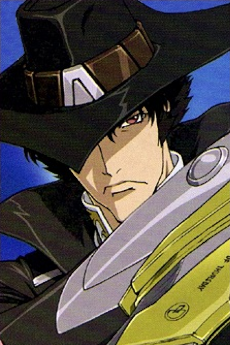
Van

Takanori Hoshino
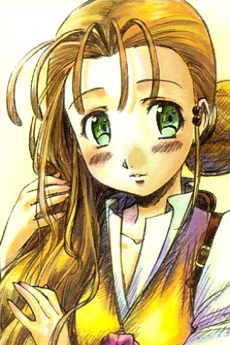
Wendy Garret

Houko Kuwashima

Narrator
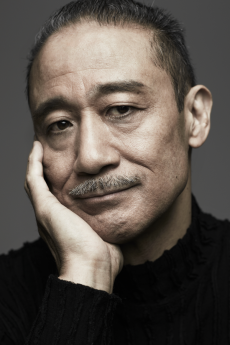
Banjou Ginga
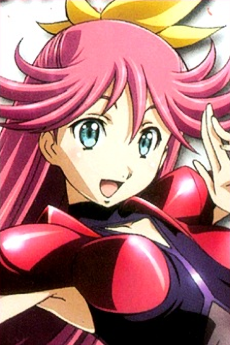
Pricilla
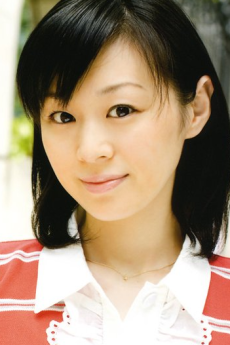
Saeko Chiba
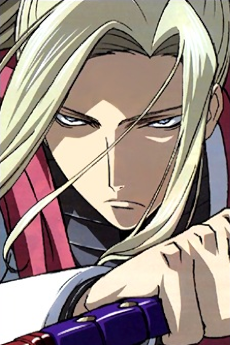
Ray Lundgren
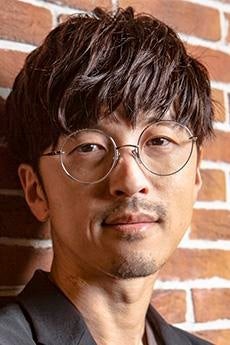
Takahiro Sakurai
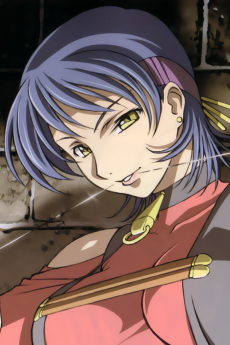
Carmen 99

Kikuko Inoue
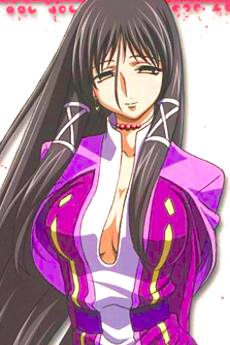
Fasalina

Masayo Kurata
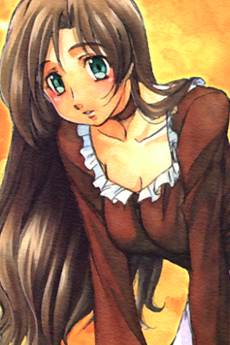
Yukiko Steavens

Satsuki Yukino
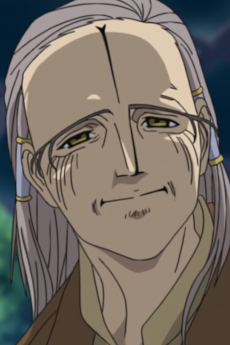
Kagitsume no Otoko

Kenyuu Horiuchi
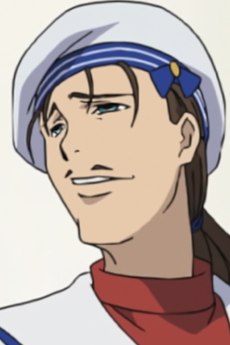
Kaiji
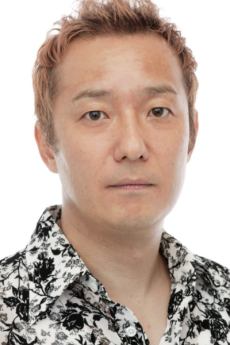
Masaya Onosaka
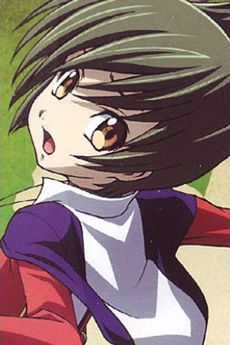
Mellisa

Chiwa Saitou
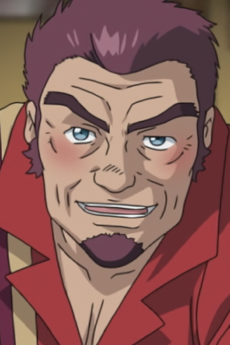
Nero
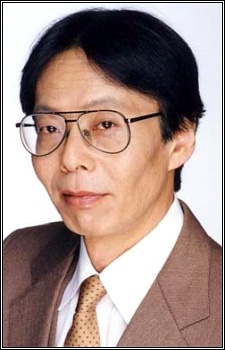
Masaharu Satou
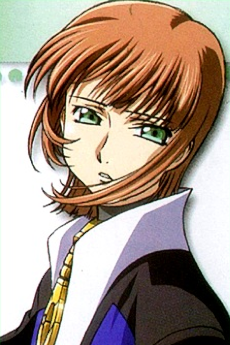
Michael Garret
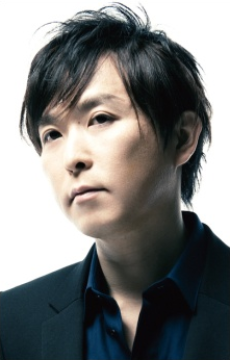
Souichirou Hoshi
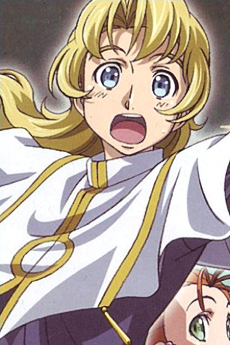
Joshua Lundgren
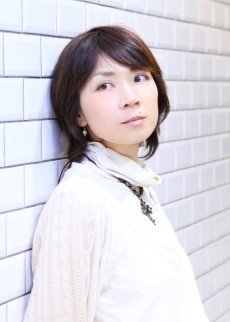
Junko Noda
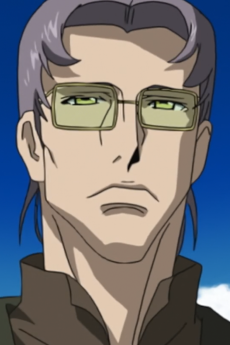
Joe Lutz
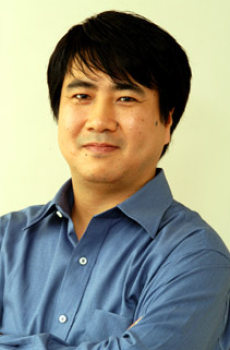
Yasunori Matsumoto
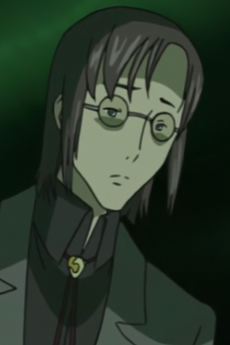
Kenkyuuin
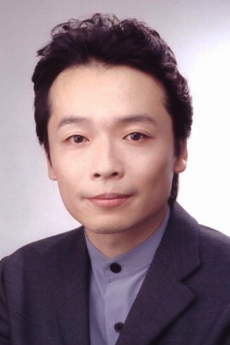
Tetsu Shiratori
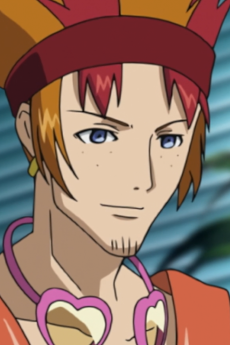
Kratt

Eiji Yanagisawa
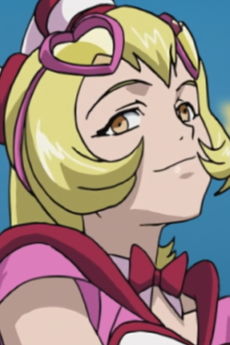
Bunny Montana

Megumi Toyoguchi
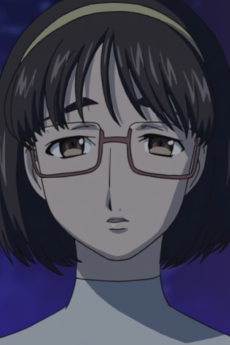
Johanna

Omi Minami
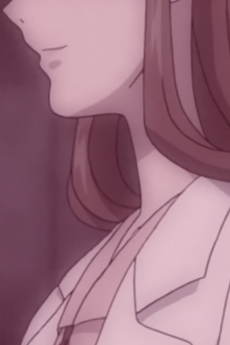
Elena

Mami Kingetsu
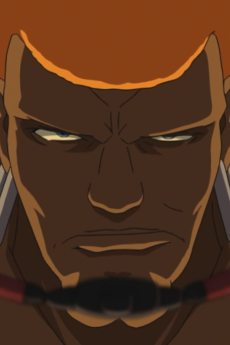
Lucky The Roulette
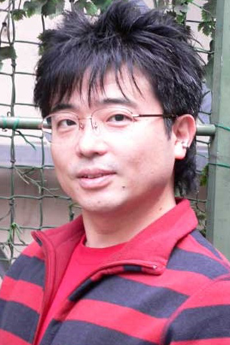
Kyousei Tsukui
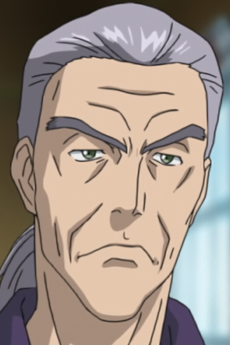
Jose
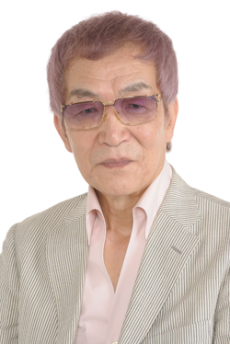
Motomu Kiyokawa
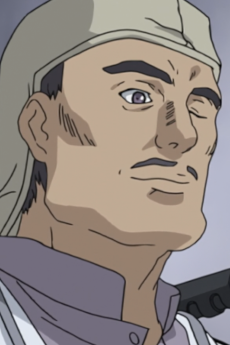
Denehee
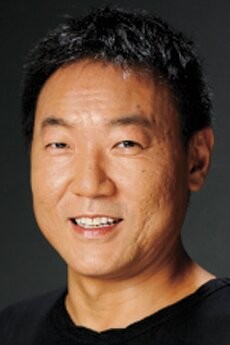
Jin Yamanoi
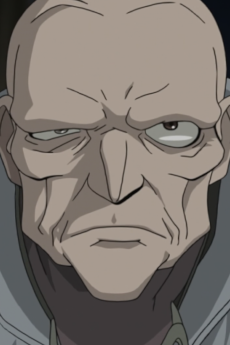
Findley

Ryuuji Nakagi
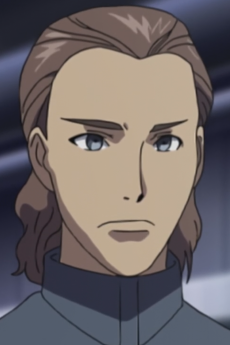
Zapiero Muttaca
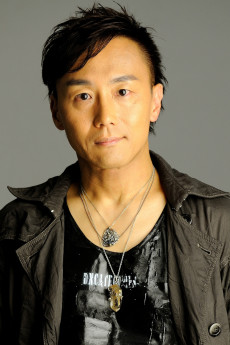
Ryuuzou Ishino
EPISODES
Dubbed
RELATED TO GUN X SWORD
 SPECIAL ComedyGun x Sword-san
SPECIAL ComedyGun x Sword-san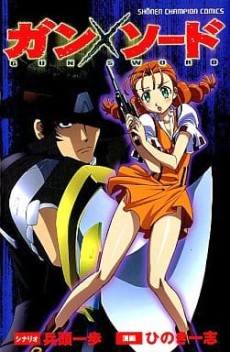 MANGA ActionGun x Sword
MANGA ActionGun x SwordREVIEWS

bmoore07
40/100Focused on the bigger picture, Gun x Sword doesn’t apply the same attention to the smaller pieces of the puzzleContinue on AniList
He appears to be on top of the world. Boasting a picturesque cleft chin, surrounded by a legion of followers that fervently scream his name and a trio of women that lovingly caress his shoulders, this man seems to be the center of attention, and he’s not only aware of this but he enjoys it as well. This man is Lucky Roulette, the ringleader of a gang known as the “Wild Bunch”. They’re a nasty assortment of thugs, mugging, murdering and inflaming anyone or anything that obstructs their path to riches and renown. The “Wild Bunch” migrate from one town to the next, mercilessly pillaging the inhabitants’ resources before moving to the next locale. Their acts of destruction are all overseen by Lucky, who views each undertaking as an opportunity to assess how much luck he possesses.
“It’s the one thing in God’s domain. No training to it. No honing of one’s skills. Nothing. That’s why I want to test it. I want to find out just what God thinks of me,” - Lucky
To that end, he endeavors into each heist without abandon, which simultaneously endangers his life and pushes the boundaries of his good fortune. Cackling maniacally, twirling his pair of revolvers, Lucky obliterates everything in his line of sight and, through pure luck, he finishes with nary a scratch on him. Because of this, Lucky feels as though he’s not only fortunate but exceptional as well. He believes that no matter what activity he partakes in, he’s guaranteed to succeed because of his luck. However, it is when Lucky begins terrorizing the small town of Evergreen and encounters a hopeless drifter named Vahn that everything changes for him.
When Lucky learns that Vahn injured a few of his members during one of their raids, he coerces Vahn into playing a simple card game with him as a method of uncovering how talented Vahn is. In the middle of this game, he promises Vahn that no harm will come to him if he wins. Lucky also claims through a lengthy monologue that attacking Vahn would contradict his personal code of honor, stating that he only engages in fair fights. However, when Lucky loses the card game, he reneges on the promise he made. Valuing his good fortune above all else, Lucky believes that, during the card game, Vahn deprived him of what he cherishes most. As a result, he ambushes Vahn in a dark alley and drenches him with steaming hot lead, which not only triggers his ultimate downfall but also tarnishes the moral principles he claimed to protect.
Lucky Roulette’s characterization is a blatant argument against the concept of an honorable criminal. He discourses at great length on righteousness, claiming to support his moral code, but when circumstances demand he prove where his loyalties lie, he abandons his beliefs. Stripped of his noble platitudes, Lucky is your typical bandit, just as petty, self-absorbed and shortsighted as his peers (if not more so). Lucky’s proclamations of honor only serve to emphasize the extents his hypocrisy reach, which makes him all the more fascinating to watch during his brief appearance in Gun x Sword.
In the context of this show and what it aims to accomplish, Lucky Roulette is but a one-off villain, defeated in its very first episode, never seen (nor referred to) again; he is a pawn, unwittingly participating in a scheme far bigger than he could ever fathom. Lucky’s role is minor, yes, but it does carry some level of significance. With each episode, Gun x Sword would burrow further and further into the concept of an honorable criminal, exploring the nuances of this idea through various individuals (each with their own unique moral code), before ultimately confronting it via its main antagonist (who is arguably the most complex “honorable criminal” of them all). However, this thematic exploration all begins with Lucky and his card games. Honestly, the fact that Gun x Sword created such an insignificant character and used him to establish the groundwork for one of its most essential concepts speaks volumes about the level of writing we’re dealing with here.
It’s difficult not to marvel at the scope of this show’s vision. Gun x Sword (GxS) is ambitious, an anime aiming to integrate a myriad of themes and concepts into a narrative that seamlessly transitions from episodic, small-scale events to a far larger plotline (what GxS accomplishes with the idea of an honorable criminal is but one of many feats its storytelling achieves). During this transition, it ceaselessly diversifies the intent of its individual vignettes, each episode (unique in its own right) serving as an experiment for GxS’s overall purpose. While one episode is a Pulp Fiction parody, another is a high-stakes mecha tournament. This is an anime that can dedicate one episode to elaborating on the dangers of childhood nostalgia and an entirely different episode to waxing poetic on the merits of bathing suits. It is this wondrously creative writing that highlights the adventures of Gun x Sword’s protagonists Wendy and Vahn.
Established on the Earth-like planet known as the “Endless Illusion”, GxS is an anime that’s partially defined by its scenic backgrounds, by its gorgeous fight scenes, and by its devastating plot twists but what guides all of this forward are the motives of this show’s central characters. Wendy is an insecure yet assertive young girl, an individual whose arc is focused on retrieving her older brother Michael from the clutches of The Claw (GxS’s main antagonist), alongside surviving and maturing in a world that doesn’t favor her small stature. Vahn is the stereotypical anti-hero, a poor man’s Spike Spiegel that’s pursuing The Claw because he murdered his wife at their wedding three years before this show takes place (as a memento, Vahn still wears the tuxedo from that day).
Together, Wendy, Vahn and their motives are the foundation for Gun x Sword, and all that it aspires to do. They are also the nucleus of an anime that prioritizes its ambitions far too often for its own good.
With its wings stretched behind it and its chest puffed out in front of it, Gun x Sword is Icarus, grasping the heavens above but ignoring virtually everything outside of its line of sight. This show propels its narrative (and the multitude of ideas embedded within it) into increasingly innovative directions but, in the process, it mishandles and (at times) neglects more than a few impactful plot elements. Focused on the bigger picture, Gun x Sword doesn’t apply the same attention to the smaller pieces of the puzzle.
This show is one that attempts juggling several concepts at once but, though this pursuit is admirable, it doesn’t always succeed. While it’s understandable that GxS struggles under this workload, the degree to which this show fumbles with some of its ideas is, at times, baffling. For starters, there is a certain subplot involving a watchdog and its two puppies that exudes the stench of a halfhearted effort. Gun x Sword tries positioning these characters as devices for an overarching message on the human condition but it doesn’t dedicate enough time to properly develop this idea and the result is naturally less than ideal. Then, there are the unsettling implications contained within the dynamic between Wendy (who is in her early teens) and Vahn (who is in his mid-twenties) that Gun x Sword never bothers exploring.
I don’t expect this show to present a detailed opinion on underaged relationships but, if you’re going to portray your protagonists with a considerable age difference as a couple (and, dear God, is GxS guilty of this), then a comment or two on how you feel about this topic shouldn’t be too much to ask for. Naturally, there are other concepts that GxS fails to flesh out in one way or another (of particular interest is episode 14’s tragically underdeveloped viewpoint of mass-produced machines) but, in the grand scheme of things, they (and the deficiencies I mentioned earlier) are inessential. When examined individually, that might not appear to be the case. However, in the context of all that Gun x Sword represents and accomplishes, their importance is downsized considerably. What this show forfeits on a conceptual level by botching several of the themes it tackles, it more than compensates by emphasizing its force of personality.
Gun x Sword has quite the theatrical flair. This show doesn’t merely advance its plot lines to thrilling peaks; it revels in those dramatic highs. GxS throws itself wholeheartedly into exploiting each and every twist and turn its story takes for maximum effect. The result is a show whose overdramatic approach is simply irresistible to watch. And for something like this, it requires a soundtrack that’s worthy of its efforts. GxS needs a soundtrack that’s just as gloriously over-the-top as it is, a soundtrack that not only complements the tone of this series but elevates its theatrics to new heights.
Luckily, Kotaro Nakagawa, famed composer of the soundtracks for Code Geass and Planetes (among others), is here to make this possible.
It’s his experience with creating uniquely cinematic scores that allows GxS’s music to flourish. Primarily reliant on a combination of orchestral and jazz, this show’s score is highlighted by the intensity of its sound. Nakagawa’s saxophone riffs awaken with the fervor of a firework display while his violin solos roar with a Hans Zimmer-esque self-importance but GxS’s score really shines in his efforts with Hitomi Kuroishi. A frequent collaborator on Nakagawa’s projects (and a musician I’ve long admired), Kuroishi provides her harp, her drums and (of course) her angelic voice to this show’s soundtrack with her songs “Paradiso” and “La Speranza”.
As awe-inspiring as the songs created by Nakagawa and Kuroishi are, it is Gun x Sword’s opening theme that’s truly the pinnacle of its musical brilliance. Backed by a symphony of trumpets and drums, it is a series of climaxes, energetically transitioning from one to the next. It is also a marriage between flute solos and background vocals. Last but not least, it is an opportunity for Gun x Sword’s supporting cast to be properly introduced.
In the opening theme, they are nothing more than silhouettes. However, in the viewpoint of first impressions, they seem to be nothing more than plot devices; they appear to be mouthpieces masquerading as characters (and not very talented mouthpieces, at that). Every message GxS conveys through its supporting cast makes for an unappetizing watch. Shallow at its best and heavy-handed at its worst, this show’s social commentary is one that not only offers nothing new to the issues it discusses but it also pushes to the forefront a rather limited perspective. When its characters state their opinions on topics like ageism, classism, and sexism, their efforts betray a lack of knowledge on the subject matter.
As more exposure is provided to the supporting cast, these individuals are allowed opportunities to deviate from their mouthpiece roles and to distinguish themselves. While this show falters in communicating social themes through its supporting cast, it shines in developing their personalities. With the benefit of a different approach in place, it’s apparent that these characters are more than tools for GxS to employ however it desires; they are people striving to preserve their beliefs and fulfill their ambitions. Enhanced by these intensely personal characteristics, the supporting cast is rendered human, which ultimately makes investing in their individual journeys far easier.
The supporting cast truly is a collection of fascinating characters, which consists of (but certainly isn’t limited to) Ray Lundgren (an enigmatic loner with a scathingly cold demeanor), Michael Garrett (a deconstruction of the shonen protagonist), Joshua Lundgren (a mechanic whose inferiority complex is played for laughs), and Priscilla (a confident tomboy that compensates a lack of intelligence with her zeal). Each of them is solidified as characters through their willingness to defend their beliefs and ways of life. As a result, the fights that occur in GxS aren’t merely exchanges of blows. They are philosophical conflicts, sprung to life by the determination of each combatant and their reliance on their principles. Not only does this cause the supporting cast to be all the more enjoyable but it also adds a layer of nuance to this show’s overall theme of revenge.
A hero falls victim to devastating circumstances, resulting in the deprivation of everything he/she ever cherished. However, instead of succumbing to sorrow, the hero uses their most vulnerable moment as the driving force to settle the score with the cause of their despair. Revenge is a concept that’s both exceptionally alluring... and exceptionally narrow.
In comparison to ideas such as love, power, and prosperity (which are broad and abstract concepts that can be defined however you wish), revenge is specific and concrete, which severely limits the extent to which you can explore it. To its credit, Gun x Sword provides a valiant effort. Through Ray Lundgren and Vahn, this show not only dissects the idea of revenge but how it consumes individuals, alongside those around them and (in the end) it questions the benefit that results from revenge. However, where GxS ultimately falters isn’t in its thematic exploration but in the conclusion it reaches after its analysis.
(A useful aside: It’s impossible to overstate how important revenge is to Gun x Sword as a whole. It isn’t merely among the many themes this show builds upon. Revenge is THE theme of GxS, the concept that everything else revolves around. Vahn’s pursuit of revenge allows him to encounter Lucky Roulette (and Wendy) in the town of Evergreen, which causes this series to move forward. Without the idea of revenge, none of what GxS accomplishes (and wants to accomplish) would be possible)
Revenge for its own sake is not unique, nor is it entertaining. There must be a deeper meaning to the motive if you really want people to be invested in your character. For Ray, a man whose wife was murdered because she remained loyal to her principles, revenge is only part of what he desires. In pursuing his wife’s killer, Ray wants to uncover whether or not the choice she made was correct. For Vahn, however, it’s different. You see, after all of the time Gun x Sword devotes to questioning the purpose behind Vahn’s pursuit, the answer it reaches is the equivalent of a shoulder shrug.
By not providing any depth for Vahn’s motive, this show’s development of the idea of revenge is a half-finished effort. If this flawed thematic exploration were an isolated incident, it would be quite difficult (but not impossible) to properly appreciate everything else GxS has to offer. However, factoring in the other underdeveloped concepts that are scattered throughout this show, the various pieces of the puzzle that (by themselves) seem insignificant, results in something too devastating to overlook. Gun x Sword leans far more towards style than it does substance; this is an anime that amazes with the outlandish ideas it raises but underwhelms with how little it’s willing to develop them. It promotes itself as something of a thinking man’s shonen/mecha but its efforts in justifying this title are inconsistent, to say the least.
I admire Gun x Sword. No; it would be more accurate to say that I admire what Gun x Sword could’ve been. With its joyously overdramatic approach, its experimental narrative, and the overwhelming ambitions it aimed to fulfill, who can’t appreciate the heights this show wanted to reach? When it involves potential, few can compare to GxS. However, when it involves realizing and maximizing that same potential, this show ultimately falls short.

CaptainSalty
85/100Conceptually an interesting story and characters, but can't grasp its fullest potential.Continue on AniListSPOILERS AHEAD: Gun x Sword presents a story of revenge wrapped up in something much bigger. While the story has a linear path, every bump on the road or interaction had adds to the character's themselves, their relationships, addresses characters' philosophy, or furthers the plot with new information gained and usually more questions to answer. For the first half of the show, I have zero complaints and nothing to really criticize besides small nitpicks that aren't worth discussing. Van and Wendy's dynamic is always enjoyable to watch, especially since its handled in a way that feels realistic given what Van has been through. Our supporting characters for the first half, Carmen, Joshua, and Ray, are decent characters to add more motivations as to joining the journey. Carmen being money, Joshua being his brother, and Ray essentially being a rival to Van's dark deed by having the same goal. I appreciated the fact that seemingly the story was heavily playing into motivations and rivaling philosophies. What I believed the story was going to tell was both a story of revenge but also if revenge is the right path or not.

With such an interesting first half, I highly anticipated what came next, what philosophy was the story trying to push towards as the correct path? What was the true intentions and nature of the main villain? What will become of Ray and Van? Why did the Claw do the things he did in the past? Unfortunately half of these questions aren't really answered and none are explored to their fullest potential. It's strange when almost all the time given doesn't feel misused, besides the one episode dedicated to pretty egregious fan-service. That being said, the questions that do get answered I have to give props to the story trying its best to give the impression that this story isn't about good guys getting revenge on just an evil man.
It's spun into the question of "When can someone be forgiven for their past actions?" The man with the Claw is not someone who is seen to be a man of hatred but instead someone who has seemingly good intentions. This introduction to our apparent main antagonist definitely throws the morality of what the heroes are doing. Of course their goals of revenge still are justifiable due to the Claw's past, but what if they were trying to get revenge on a man who is both trying to better the future but also gives purpose to a lot of people's lives. It's a great setup to cast aside the "good guys" facade that our protagonist has. However, this great introduction to our villain doesn't develop much further. The idea and some execution was pulled off at the climax of the first half of the show but doesn't exactly move the concept anymore for the rest of the show. In fact, the concept is backpaddled with the main villain seemingly crazy on the surface. Of course, you could dig and head canon an explanation where the Claw is supposed to represent forgiveness and pacifism (albeit the pacifist part is shaky at best), while Van is unforgiving vengeance. Those two on paper sort of switch the two roles without any context, but with what we know the Claw has done to Van, and the Claw's goal seemingly making him an antagonistic force once again, we've, again, backpaddled the concept to become a "good reason to get revenge and save the present" making any of the morality of vengeance all but forgotten.
You could make an argument for the Claw's vision and how its conceptually not bad, but its nothing more than a fantasy. For everyone to be the same, which means no conflict, no unequal status, all down to having the same dream. It's once you look into it more than a second that it really is horrible. But from characters like Fasalina its clear that this cult-like group may have preyed on vulnerable people, it makes sense why they wish for eternal peace at the cost of their own identities.
But not all concepts and messages are lost or lose meaning in the show. It still does a great job of showing that revenge can rip the person seeking it to a shadow of their former selves, the different kinds of paths people take to get revenge, what paths are truly right or wrong, and dreams. Ray and Van both suffer physical and mental damage in their pursuit of the Claw, either from each other or due to their enemies. Van believes that killing everyone in his path is unnecessary, trying to keep some moral compass despite his ultimate goal. He only wishes for the man who essentially ruined his life and killed him to die, but in situations where its them or him, he's ready to do the deed. While Ray is the embodiment of "the end justifies the means," killing anyone that stands in his way, refusing to hold anything back no matter who they are. Ray suffers from essentially losing his sight and depth perception and Van loses his satellite which puts him on a death sentence (he loses the other satellite and its unexplained why he's fine in the epilogue after his lifeline is destroyed again). But despite Ray and Van being rivals with the same goal, they both achieve what they want in a way. Ray dies and believes that he kills the Claw after he sees his shocked expression, not from being shot but from his plan seemingly being stopped. Ray then rests in peace and dies. It's a very fitting end to such a bloodthirsty and sad person who had his dream stolen from him.
Many others find their peace by the end, Wendy metaphorically finds her closure with her brother and matures, and Van accomplishes his goal. My one nitpick from Van's fate is that I believe he also should have died after killing the Claw. Due to being the literal embodiment of the past and vengeance, wearing his tuxedo from the day he "died" and his only real thought being to kill the Claw. We do in a way see that by his hat falling off as soon as he kills the Claw but I also believe that the idea of him being a spirit of vengeance is a lot more fitting than the "perfect all ends well" ending he got. Although I can see the appeal of him moving on now and maybe finding the emotion of love again. But on the side of unsatisfying conclusions, we have Fasalina and Michael who both supposedly survive but you aren't told this very vital information in the show, you are told in an epilogue audio drama (as the wiki tells me). In the show you just kind of see them finally return to their senses, realizing they have real feelings for each other that they were essentially forced to ignore, and then get crushed by a boulder. It's one of the many things at the end you scratch your head at and go "wait what? Why did that happen?" Another big headscratcher comes from the fact that everyone joins up with Van in his pursuit to kill the Claw. No one really objects to it, and in some cases like Joshua, he gives up on stopping his brother from killing. It's a bit off from what seemingly was a group of people who would never consider killing or helping someone kill. While the threat becomes global, then it makes sense but from the start all they believed it was was a grudge that had to be fulfilled.
But with all these specific thoughts out of the way, overall Gun x Sword was a fun show to watch for the majority of its run, and while it doesn't explore concepts fully, and struggles to finish in the satisfying way it sets up, I can't lie that most of this show was well written fun. The voice work is phenomenal, the imagery and metaphors in episodes were amazing, the direction and voice work never failed to impress, and most apparent, the music was incredible start to finish. It easily is on par with the Cowboy Bebop soundtrack with its ethereal, fun-spirited, and cinematic tones with an unforgettable opening and ending thanks to Kotaro Nakagawa and Shuntaro Okino.
SIMILAR ANIMES YOU MAY LIKE
 ANIME ActionCowboy Bebop
ANIME ActionCowboy Bebop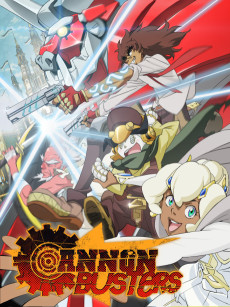 ONA ActionCANNON BUSTERS
ONA ActionCANNON BUSTERS ANIME ActionSamurai Champloo
ANIME ActionSamurai Champloo ANIME ActionBack Arrow
ANIME ActionBack Arrow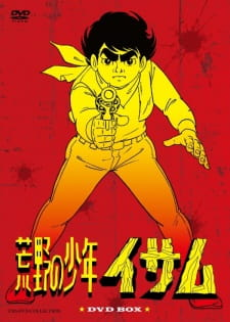 ANIME ActionKouya no Shounen Isamu
ANIME ActionKouya no Shounen Isamu
SCORE
- (3.45/5)
MORE INFO
Ended inDecember 26, 2005
Main Studio AIC A.S.T.A.
Favorited by 177 Users




